Countdown to 2030: Research Highlights Malawi’s Maternal and Child Health Successes and Critical Areas for Improvement
Countdown to 2030: Research Highlights Malawi’s Maternal and Child Health Successes and Critical Areas for Improvement
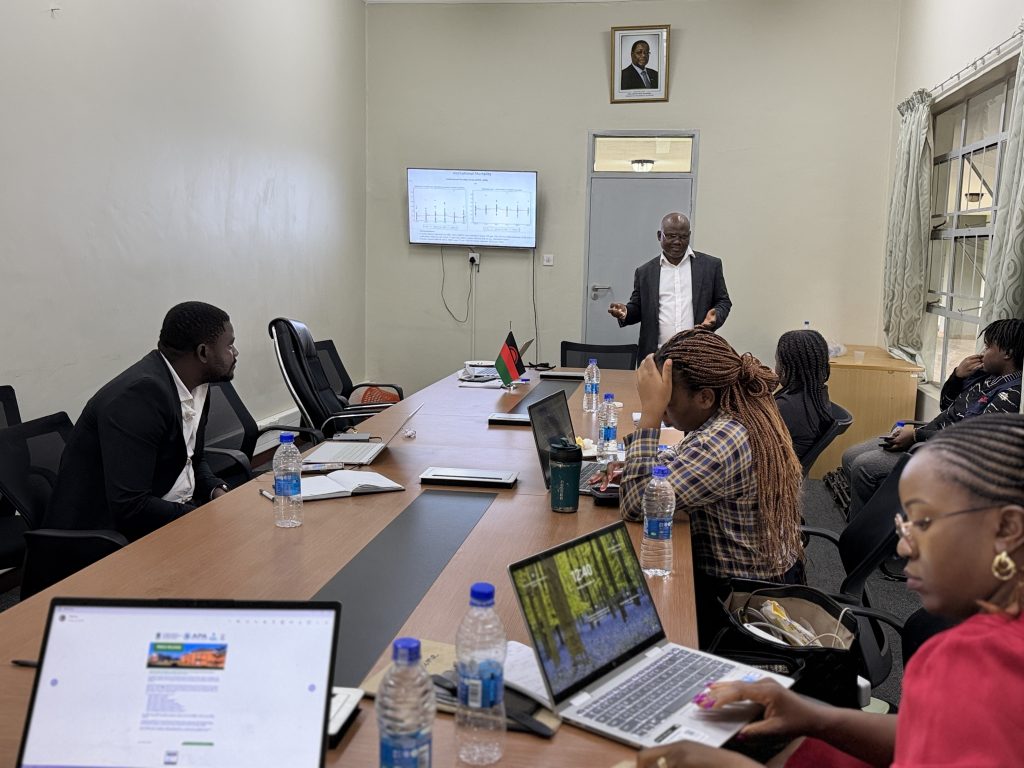
Malawi has demonstrated significant strides in its maternal, newborn, child, and adolescent health landscape over the past five years, according to a recent analysis conducted under the Countdown to 2030 initiative.
The report, a collaborative effort by Kamuzu University of Health Sciences, School of Global and Public Health, and the Ministry of Health’s Reproductive Health Directorate highlights encouraging improvements in service coverage, health outcomes, and data utilization, while also pointing to critical areas that require sustained attention.
Leading the Malawi Countdown 2030 Research team from KUHeS, Principal Researcher Adamson Muula presented the findings during a media training conducted sometime last month.
“The Pentavalent 3 vaccination coverage for Malawian under 5 children is at least 94%; while the World Health Organisation (WHO) global target is 90%. For our country, there is no difference in vaccination uptake based on residence status (rural vs urban), wealth status or maternal education. At least 96% of Malawian mothers deliver in a health facility,” Muula said.
Leading the Malawi Countdown 2030 Research team from KUHeS, Principal Researcher Adamson Muula presented the findings during a media training conducted sometime last month.
“The Pentavalent 3 vaccination coverage for Malawian under 5 children is at least 94%; while the World Health Organisation (WHO) global target is 90%. For our country, there is no difference in vaccination uptake based on residence status (rural vs urban), wealth status or maternal education. At least 96% of Malawian mothers deliver in a health facility,” Muula said.
However, despite these gains, important gaps remain such as coverage of early antenatal care and four or more ANC visits is still below the global target of 70%, pointing to missed opportunities for early detection and prevention of pregnancy-related complications.
“National averages also mask significant district-level inequalities, particularly for immunisation and institutional delivery, with some districts consistently lagging below 70%. While maternal education does not appear to be a major barrier to service use, geographic and rural-urban differences persist, highlighting the need for targeted district-specific action or intervention,” he said.
One of the journalists from The Times Group, Mercy Matonga said the training was enlighting further saying the information from experts on the ground helps them to write with facts.
“The Malawi Countdown 2030 team has presented us with a clear picture: the insights from this meeting are important.This dialogue has equipped us, the media, with crucial insights to inform the public and advocate for meaningful change,” she said. The media interface included journalists from Malawi Broadcasting Corporation (MBC), Zodiak, The Times Group and The Nation.
Minister of Education dates KUHeS Management
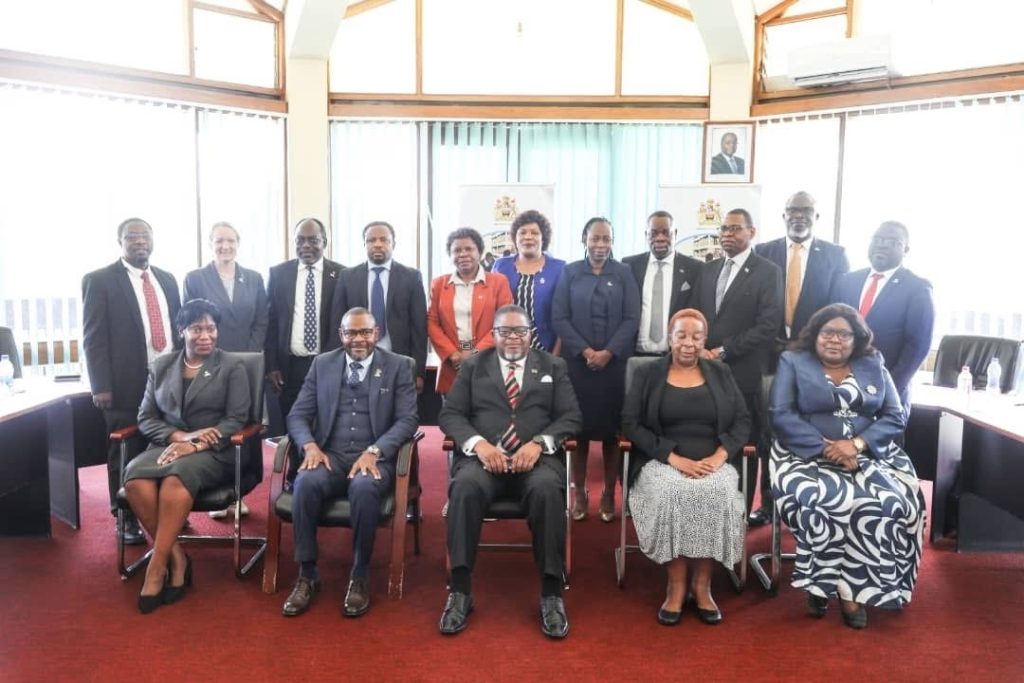
The Minister of Education, Science and Technology, Honourable Bright Msaka, SC, has reiterated the Malawian government’s unwavering commitment to the Kamuzu University of Health Sciences (KUHeS).
This reaffirmation came during a recent courtesy call by KUHeS executive management, where discussions centered on bolstering the delivery of quality health sciences education and research.
Led by Vice Chancellor Professor Mac Mallewa, the KUHeS delegation provided the Minister with a comprehensive briefing on the university’s current operations, significant challenges, and future strategic direction. The meeting also served as an opportunity for Professor Mallewa to congratulate Minister Msaka on his recent appointment.
During their presentation, KUHeS management detailed the institution’s background and current status, emphasizing its long-term vision for achieving financial sustainability and institutional independence.
Key challenges highlighted included persistent underfunding and delays in student intake, for which interim remedial measures were proposed.
In his response, Minister Msaka underscored the government’s dedication to supporting KUHeS in its vital mission.
He further committed to scheduling a follow-up meeting between the Ministry and KUHeS. The subsequent meeting will focus on assessing the progress of the proposed measures and addressing any remaining outstanding issues to ensure the university’s continued growth and success. This is the first time a sitting minister has met the entire KUHeS Management to deliberate on issues to promote the welfare of the university. The team comprised the Vice Chancellor, the Deputy Vice Chancellor, five Executive Deans, Director of Finance, Registrar, Acting-Deputy Registrar, Director of Student Affairs, Acting Director of Teaching and Learning Development Centre and Acting Director of Institute of Postgraduate Studies and Research.
KUHeS Participates in 21st RUFORUM AGM, Strengthens Continental Collaboration in Botswana
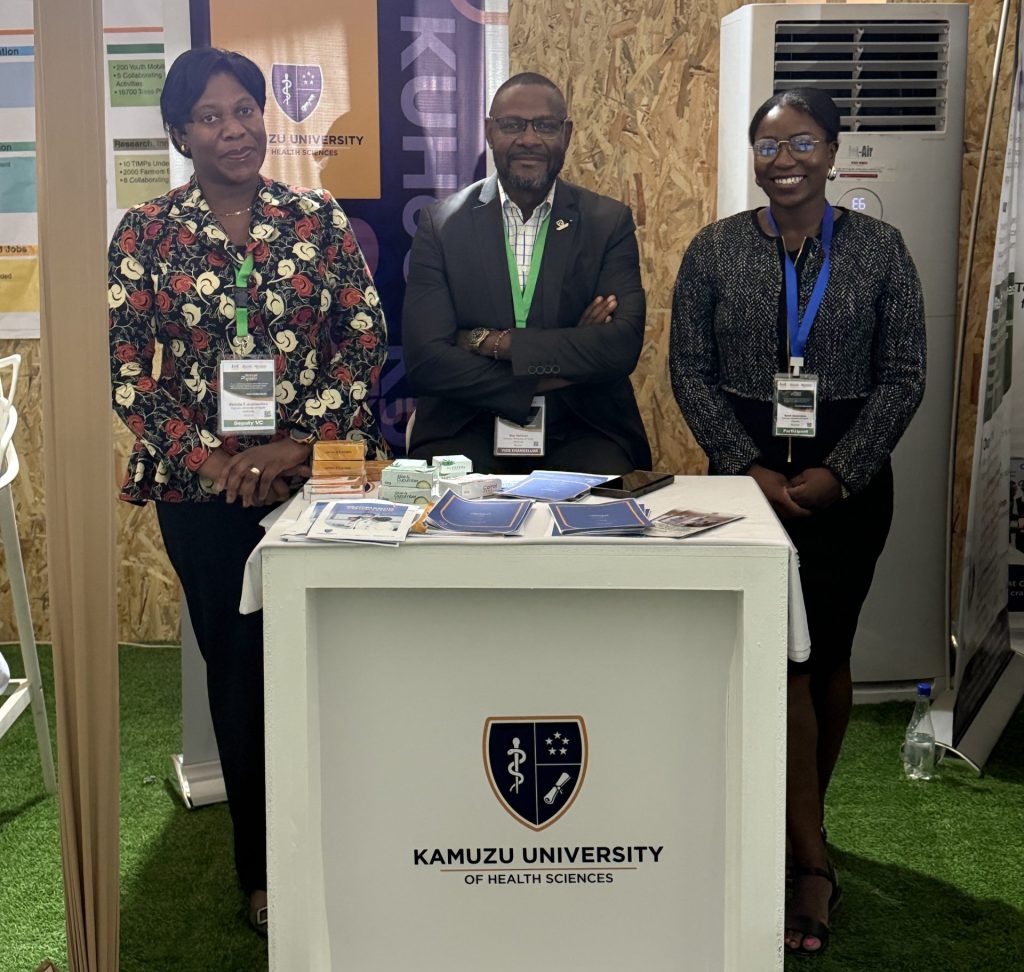
The Kamuzu University of Health Sciences (KUHeS) has once again joined fellow universities from across Africa at the 21st Annual General Meeting (AGM) of theRegional Universities Forum for Capacity Building in Agriculture (RUFORUM), currently taking place in Botswana. The AGM serves as a premier continental platform for fostering innovation, collaboration, and shared learning among higher education institutions.
This year’s week-long conference has drawn a diverse gathering of universities, researchers, policymakers, development partners, and young innovators. Over the course of the event, participants will take part in exhibitions, panel discussions, and collaborative dialogues centered on advancing research, strengthening academic networks, and addressing key development challenges affecting the region.
Leading a three-member delegation that include Deputy Vice Chancellor Associate Professor Dr. Belinda Gombachika and Communications Officer Serah Chilora, Vice Chancellor Professor Macpherson Mallewahas underscored the significance of the meeting, describing it as “a good ground for breeding collaboration and showcasing what KUHeS does.”
He noted that KUHeS’ continued participation in RUFORUM enhances the institution’s visibility, particularly its expanding portfolio in research and innovation, while opening doors to strategic partnerships in health sciences and related fields.
During the AGM, KUHeS will engage with various delegates to highlight its impactful work in health research, medical education, community outreach, and health systems strengthening. The university will also showcase a range of herbal products developed under the African Centre of Excellence in Public Health and Herbal Medicine (ACEPHEM).
Held under the theme “Positioning Africa’s Universities and the Higher Education Sector to Effectively Impact Development Processes on the Continent,” the conference has attracted more than 500 participants, including university leaders, private sector actors, development partners, students, and researchers from across Africa and beyond.
Founded in 2004 by ten African Vice Chancellors, RUFORUM has grown into a robust network of 175 universities across 40 countries, representing the five regions of eastern, southern, central, western, and northern Africa. The network continues to strengthen higher education institutions’ capacity to drive development and innovation across the continent.
KUHeS Ophthalmology Unit Strengthens Partnership with UK’s Trifocal Trust
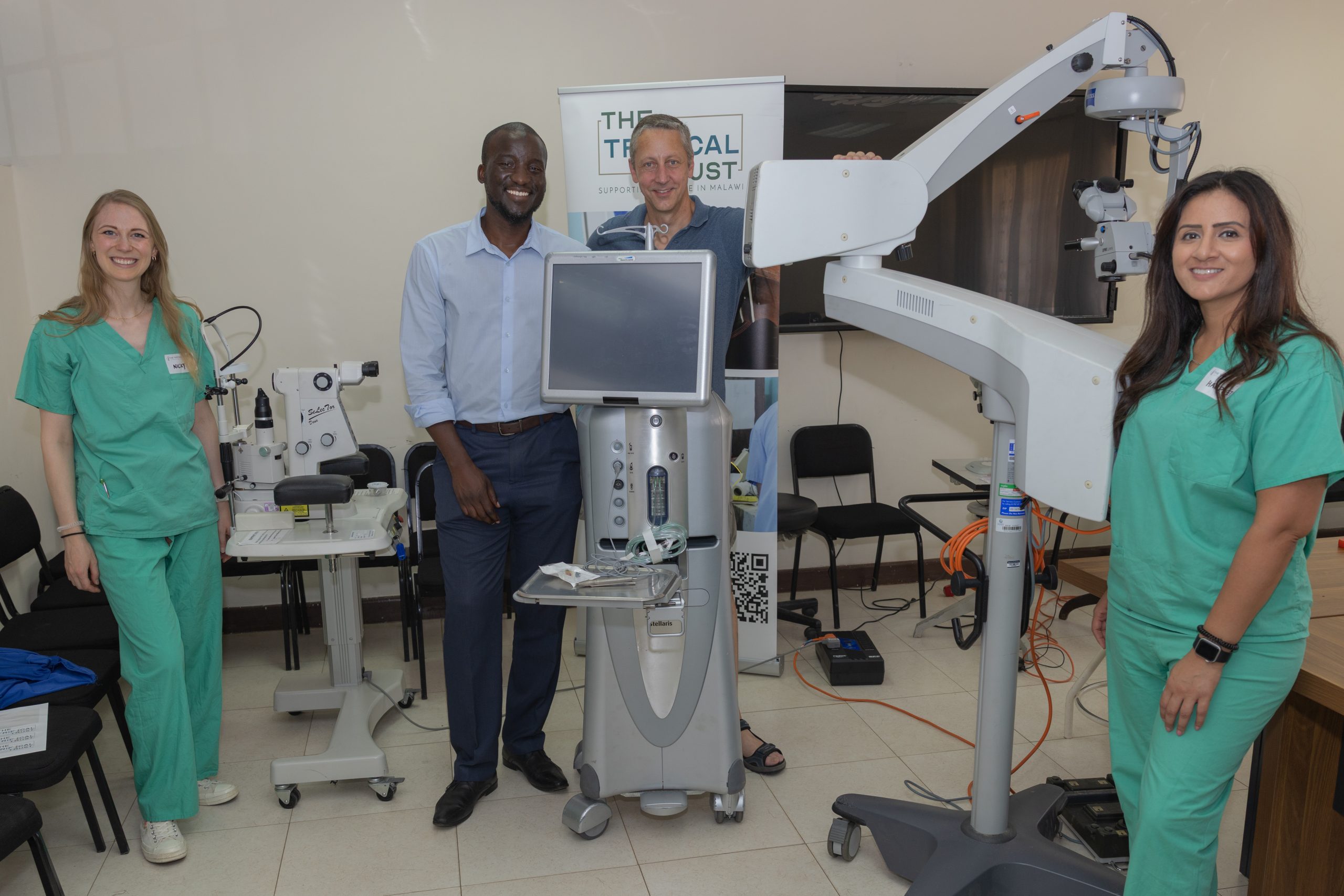
The Ophthalmology Unit at Kamuzu University of Health Sciences (KUHeS), in collaboration with the Lions Sight First Eye Unit at Queen Elizabeth Central Hospital (QECH), has significantly enhanced its training and service delivery capacity through its ongoing tripartite partnership with Trifocal Trust a UK-based Non-Governmental Organisation (NGO).
Since the partnership began two years ago, the Trifocal Trust has supported the Unit by providing surgical training as well as donating essential ophthalmic consumables and clinical supplies.
However, this year marks a major milestone, with the donation of advanced ophthalmic equipment comprising a Selective Laser Trabeculoplasty (SLT) machine for Glaucoma treatment, an operating microscope for theatre use, and an anterior Vitrectomy machine; the first of its kind at QECH.
During a one-week-long visit in October this year, Dr Steven Harsum, on behalf of the Trifocal Trust team, conducted a series of hands-on trainings and lectures for both faculty and residents.
The sessions covered how to operate and maintain the newly donated equipment, as well as practical skills in innovative, low-cost surgical techniques for implanting intraocular lenses in complex cases. These interactive trainings have strengthened clinical confidence and surgical capacity within the Ophthalmology Unit.
As is customary with their visits, the Trust’s delegation included several trustees, as well as optometrists with specialised expertise who provided on-site mentorship and knowledge exchange.
Speaking on the importance of the collaboration, Associate Professor Petros Kayange, Head of Ophthalmology and the Department of Surgery at KUHeS, said: “SLT laser surgery was previously not available in Blantyre. This new equipment introduces another treatment option for glaucoma patients, particularly those who may not be able to afford long-term medication.”
Dr Shaffi Mdala, Consultant Ophthalmologist at QECH added: “This partnership represents a model of how academia, clinical practice, and international collaboration can align to address real gaps in patient care. The donated equipment, coupled with the skills transfer through training, ensures that the benefits reach patients directly and sustainably.”
Nicky Cathrow, a Trustee of the Trifocal Trust, echoed these sentiments, stating: “We continue to be inspired by the dedication of the ophthalmology team at QECH. Their passion for improving patient care is truly remarkable. It’s been a privilege to collaborate with Dr. Mdala and his colleagues in delivering training and equipment that will have a lasting impact. We are especially grateful to our generous donors, and charity ambassador Mr Harsum, whose support made these contributions possible. We look forward to building on this partnership to strengthen eye care services in Malawi.”
The partnership between KUHeS, QECH and the Trifocal Trust continues to exemplify how international collaboration can enhance specialist training, expand access to modern eye care, and build sustainable local capacity for eye care services in Malawi.
KUHeS TAPS INTO GHANA’S HERBAL MEDICINE SUCCESS STORY
KUHeS TAPS INTO GHANA’S HERBAL MEDICINE SUCCESS STORY
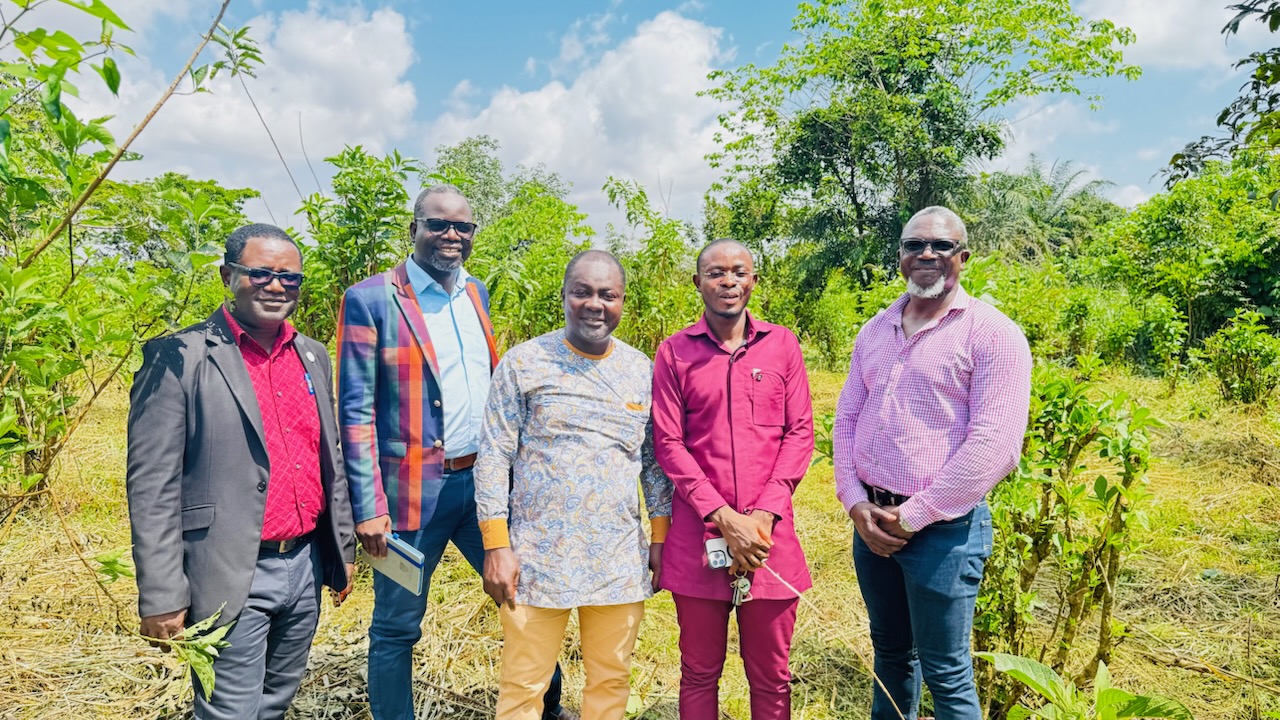
A two-member delegation from the Kamuzu University of Health Sciences (KUHeS) under the School of Life Sciences and Allied Health Professions (SLAHP) recently completed a learning and benchmarking visit to Ghana, gaining first-hand insights into the country’s well-established herbal medicine industry.
The team led by SLAHP Executive Dean, Associate Professor Arox Kamng’ona, and joined by Dr. John Mponda undertook the visit as part of KUHeS’ preparations to establish a pharmaceutical manufacturing plant for both conventional and herbal medicines, as well as to introduce a Bachelor of Science in Herbal Medicine programme.
The visit had three major objectives:
- Participation in the 3rd Oku Ampofo Memorial Conference, themed “Herbal Medicine Research: Harnessing our Heritage for Health and Wealth”, held at Fiesta Royale Hotel in Accra;
- A strategic visit to the Centre for Plant Medicine Research (CPMR) in Mampong-Akuapem for knowledge exchange and collaboration;
- A benchmarking visit to Kwame Nkrumah University of Science and Technology (KNUST) and its herbal industry partners in Kumasi.
Presentations and Engagements at the Oku Ampofo Conference
- During the conference, Dr. Mponda delivered a presentation titled “Towards Regulation of Herbal Medicinal Products in Malawi: Distribution, Claims and Scientific Evidence”. He also joined a panel discussion on the protection of intellectual property rights for Indigenous traditional knowledge and provided updates on Malawi’s regulatory landscape.
- Associate Professor Kamng’ona chaired a parallel scientific session focused on nanoparticles, essential oils and phytomedicine, highlighting KUHeS’ growing role in herbal medicine research.
Lessons from Ghana’s Centre for Plant Medicine Research The delegation toured the Centre for Plant Medicine Research, a statutory institution established by an Act of Parliament in 1975. The centre conducts comprehensive plant medicine research and operates a full herbal medicine clinic where licensed herbal medical practitioners diagnose and treat patients. The same facility manufactures approved herbal medicines that appear on Ghana’s national herbal medicines list.
The CPMR maintains rigorous standards through:
- Good Manufacturing Practices (GMP)
- Good Agricultural and Collection Practices (GACP) at its herbal farm
- Well-equipped quality control laboratories for phytochemistry, microbiology, pharmaceutics and toxicity studies
These systems offered KUHeS a practical model for Malawi’s own development of a regulated herbal medicine sector.
Benchmarking at KNUST: Training and Integrated Practice
At Kwame Nkrumah University of Science of Technology (KNUST), the team benchmarked KUHeS’ draft Bachelor of Science in Herbal Medicine curriculum against KNUST’s long-running programme. They toured the Faculty of Pharmacy, as well as the Departments of Pharmacognosy and Herbal Medicine, which train Ghana’s herbal medical doctors.
A key highlight was observing integrated healthcare at the Kumasi Regional Hospital, where both herbal and conventional medical doctors work side by side. Patients self-select whether to seek herbal or conventional care upon arrival at the outpatient department—an arrangement supported by shared diagnostic facilities such as laboratories and radiology services.
The team also visited Ebenage Herbal Production and Consult and Solak Biochemist Limited, two of several herbal medicine manufacturing companies and some private herbal clinics that work closely with KNUST.
Reflections from KUHeS
Associate Professor Kamng’ona described the visit as “a major eye-opener.”
“Ghana has advanced beyond many African countries in regulating herbal medicinal products, accrediting practitioners, and training skilled personnel. This is the direction KUHeS aims to guide Malawi into—grounded in proper research, scientific validation and sustainable use of Indigenous knowledge,” he said.
Dr. Mponda echoed this sentiment, emphasizing the importance of partnerships. “Our visit to the Hepa Plus production site demonstrated the value of strong quality-control systems across the production line. The best way to build Malawi’s herbal industry is to collaborate with institutions already doing well. We look forward to continuing our partnership with KNUST and Hepa Plus in training, quality control and raw-material cultivation,” he noted.
Sustainable Sourcing: A Model from Ebenage Herbal Production
The delegation also toured a 20-acre medicinal plant farm owned by Ebenage Herbal Production and Consult, producers of Hepa Plus. The farm uses no inorganic fertilizers or agrochemicals, ensuring raw materials are free from contamination—an essential component of high-quality herbal medicine production.
Head of KNUST’s Department of Herbal Medicine, Dr. Kofi Tuckson, who joined the visit, commended the initiative:
“The sustainability of the herbal medicine industry depends on the availability of raw materials. Illegal mining is destroying forests and water bodies, so these dedicated medicinal farms are essential.”
Ebenage’s Founder and CEO also highlighted the urgency of protecting medicinal resources and strengthening industry capacity: “Our primary goal is to sustain production of HEPA Plus, PAVI, and Plasmox. But we also welcome students and researchers—training the next generation is how we build a better Ghana and advance herbal medicine.”
A Strategic Path Forward for Malawi
The Ghana visit marks an important milestone in KUHeS’ efforts to professionalize and regulate herbal medicine in Malawi. The delegation returned with concrete lessons on:
- regulatory frameworks,
- curriculum development,
- clinical integration models,
- quality control systems, and
- sustainable raw-material cultivation.
These insights will guide ongoing local efforts to develop a robust herbal medicine industry aligned with global standards while preserving and valuing Indigenous knowledge.
Indian High Commissioner Explores Healthcare Collaboration with KUHeS
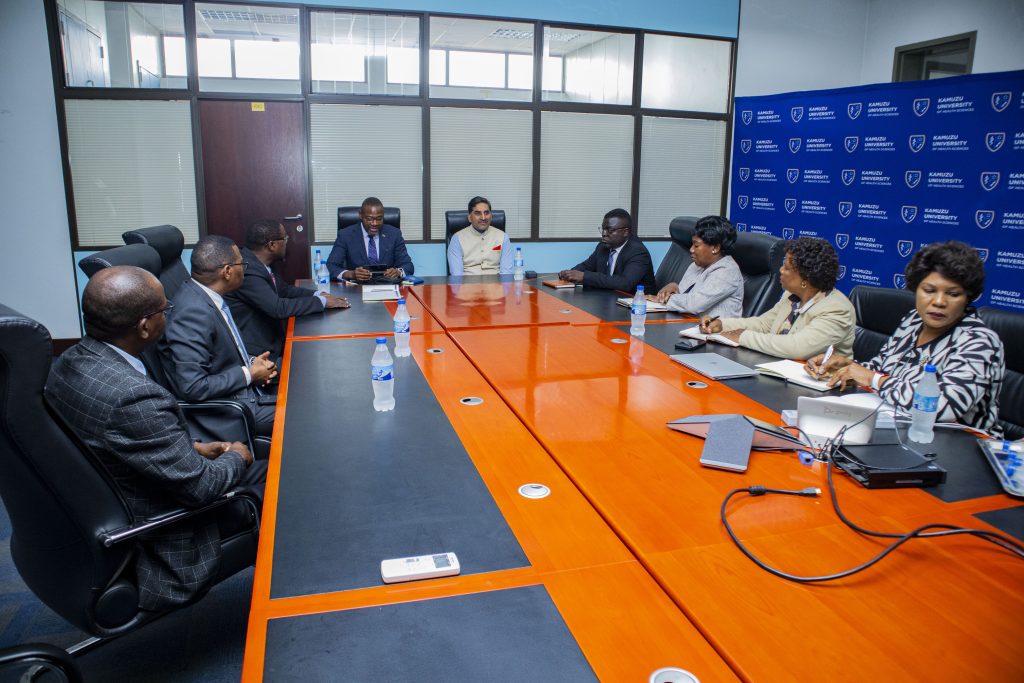
The Indian High Commissioner to Malawi, His Excellency Amararam Gujar, has pledged to strengthen healthcare collaboration between India and Malawi.
The High Commissioner made these remarks when he visited KUHeS in Blantyre where he interacted with some of the international students from Indian community and explored opportunities for partnership in healthcare delivery, research, and pharmaceutical development with KUHeS management led by the Vice Chancellor Professor Macpherson Mallewa. Commissioner Gujar noted that currently Malawi imports the majority of its pharmaceutical products from India, and emphasized the possibility for Indian investors to establish a pharmaceutical manufacturing plant in Malawi as a sustainable, long-term solution.
The High Commissioner also highlighted the possibility of collaboration between Indian laboratories and KUHeS’ state-of-the-art diagnostic laboratory. This partnership would enhance Malawi’s diagnostic capacity and reduce the need for patients to seek medical care abroad, particularly in India.
The Vice Chancellor described the visit as a boast to the university further saying the ties between the two institutions will help promote innovation and healthcare excellence in Malawi.
“We are delighted to host His Excellency Mr. Gujar and to explore new areas of collaboration between India and Malawi. KUHeS values partnerships that advance research, training, and innovation for improved health outcomes across Africa,” he said.
Speaking on behalf on the international students Dr. Megha Mittal who is pursuing a Masters in Obstetrics and Gynecology said the university is doing an amazing job in blending both local and international students. The visit underscored the shared commitment of India and Malawi to strengthening healthcare systems through cooperation in education, research, and industry, paving the way for future collaborations between the two nations.
University of Glasgow Vice-Principal Commends KUHeS for Impactful Research
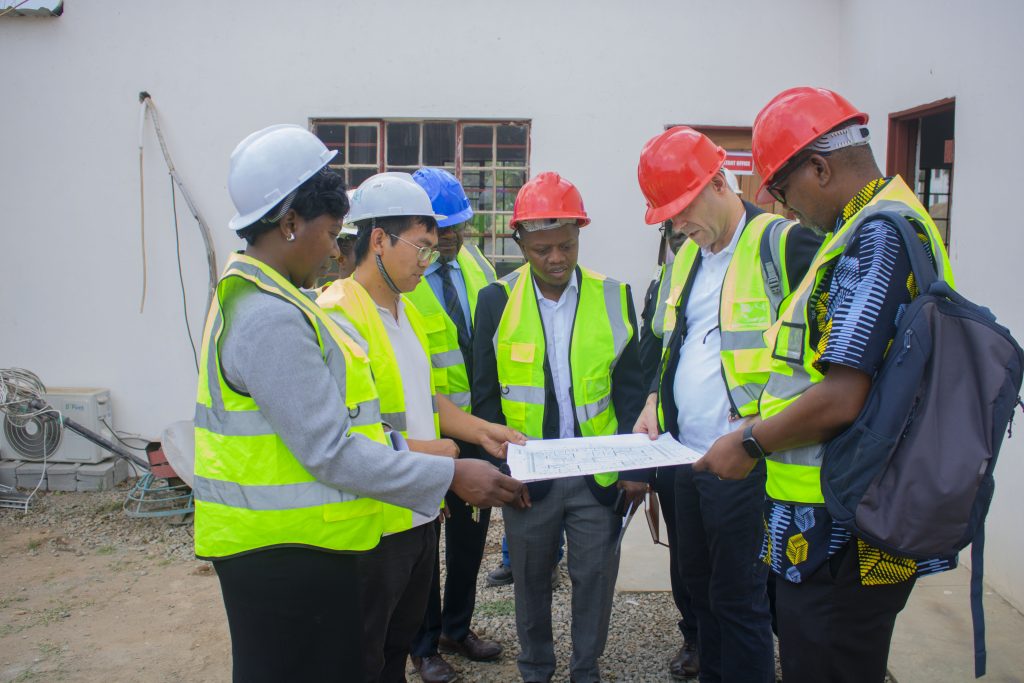
University of Glasgow Vice-Principal, Professor Chris Pearce, has commended the Kamuzu University of Health Sciences (KUHeS) for its outstanding research and the growing partnership between the two institutions.
During his visit to KUHeS at Mahatma Gandhi Campus in Blantyre, Professor Pearce toured several facilities, including the Sequencing and Tuberculosis laboratories, the Blantyre-Blantyre Project, and the construction site of the upcoming Dental School.
The visit highlighted areas of ongoing collaboration in research, innovation, and academic development. “It has been an absolute pleasure to visit KUHeS today. I have been impressed by the breadth and depth of collaboration between KUHeS and the University of Glasgow. I have met outstanding researchers doing science that truly changes lives. The warmth of the welcome I have received shows just how important this partnership is, and I am eager to see it continue to grow stronger in the years ahead,” said Professor Pearce.
He noted that his visit also provided an opportunity to explore new areas for cooperation, particularly in emerging fields of health research and education.
KUHeS Vice Chancellor, Professor Macpherson Mallewa, described the visit as a reaffirmation of the strong and enduring relationship between the two universities.
“Today is a great day because, for the second time, we are hosting a Vice-Principal from the University of Glasgow. Earlier this month, we welcomed the First Minister of Scotland and another Vice-Principal, Professor Iain McInnes. These visits reinforce the importance of this partnership one founded on shared values, mutual benefit, and long-term collaboration,” said Professor Mallewa.
Professor Mallewa emphasized that the partnership spans key areas such as research, training, and academic programming, all contributing to the growth of health education and research capacity in Malawi.
The KUHeS – University of Glasgow partnership continues to play a pivotal role in advancing science and improving health outcomes through collaborative research and innovation.
Chinese Ambassador Officially Hands Over Confucius Institute to KUHeS and UNIMA
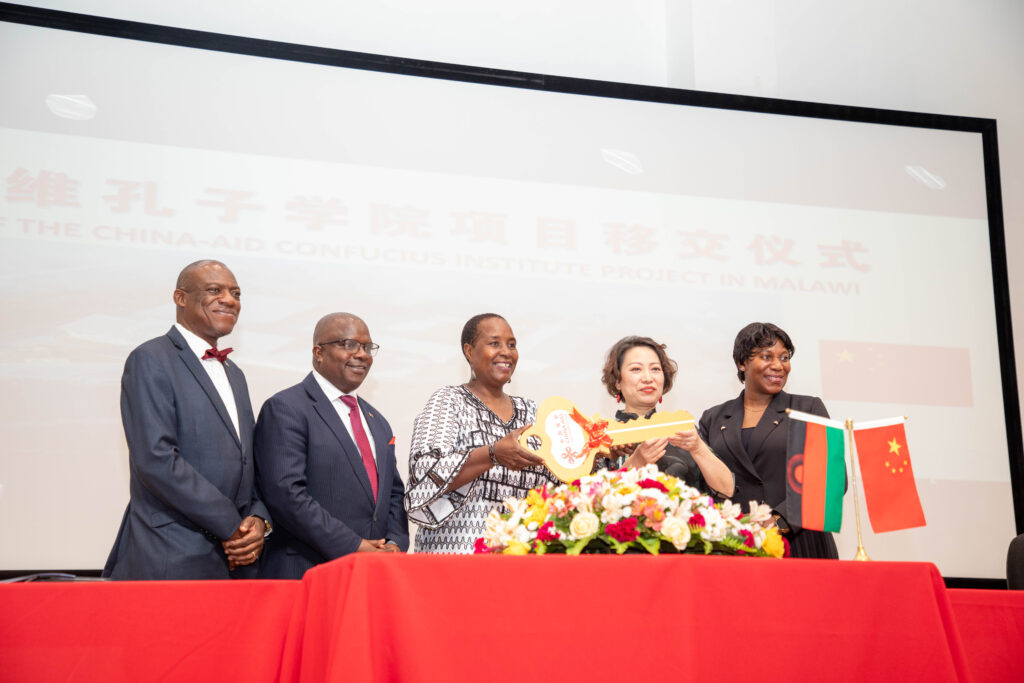
The Chinese Ambassador to Malawi, Lu Xn, officially handed over the Confucius Institute to Kamuzu University of Health Sciences (KUHeS) and University of Malawi (UNIMA).
The institute valued at $6.4 million (approximately K11 billion) among others comprise an administration block,600-seater multipurpose hall, computer room, staff rooms and board room.
KUHeS Deputy Vice Chancellor Dr. Belinda Gombachika said the opening of the Confucius Institute represents much more than the unveiling of a new facility.
“It demonstrates our commitment to enhancing educational opportunities for our students and the broader community. In an era where globalization is transforming education, learning a language like Chinese equips our students with valuable skills that improve their employability and success in an interconnected world,” she said.
The Ambassador echoed Dr. Gombachika’s sentiments, emphasizing that this infrastructure serves as a significant unifying factor between China and Malawi.
“When two nations understand each other’s language and culture, it fosters the exchange of ideas, particularly in advancing technology and infrastructure development,” she said.
Minister of Higher Education Jessie Kabwila said this development aligns with the Malawi 2063 vision.
“By establishing the Confucius Institute, we are making a decisive move toward achieving our goals. This initiative not only benefits students at KUHeS and UNIMA but also provides Malawians with the opportunity to learn a language that opens doors and promotes cross-cultural understanding,” she affirmed. The institute will officially be opened by the president who is the Chancellor to both KUHeS and Unima.
Malawi Launches Innovations Group at 4th International Congress on Global Surgery
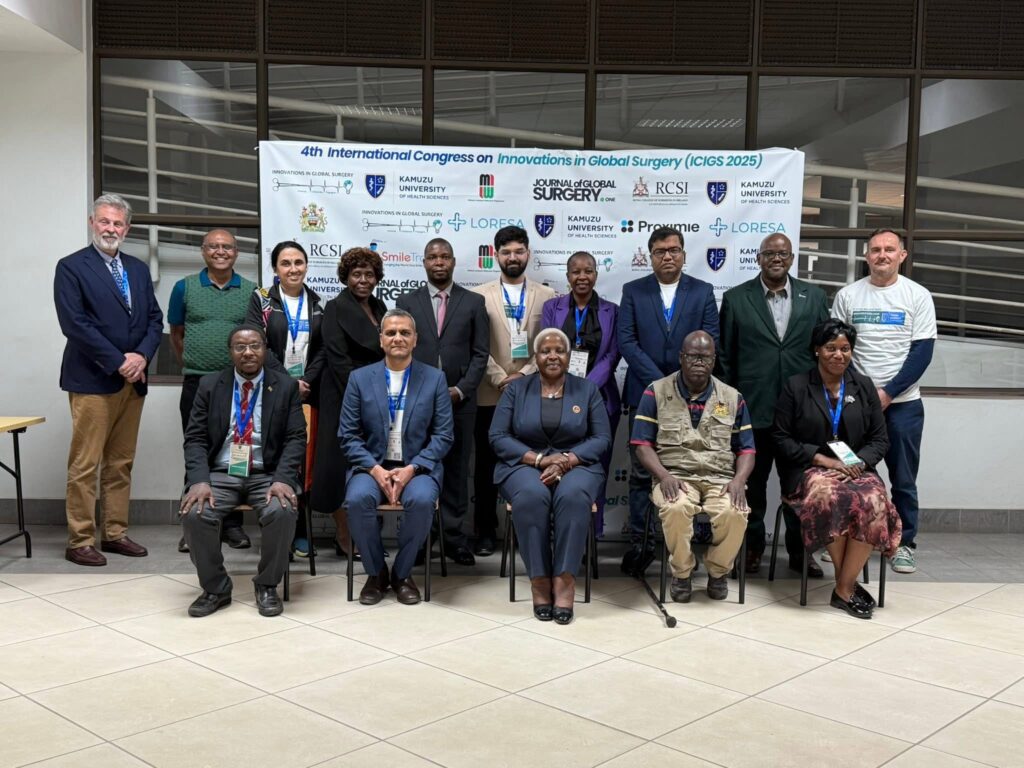
The 4th International Congress on Innovations for Global Surgery (ICIGS 2025) culminated in the formation of the Malawi Innovations Global Surgery Group, a strategic initiative aimed at advancing surgical innovation both locally and globally.
The three-day congress, held under the theme “Sustainable Innovations in Global Surgery”, was hosted by Kamuzu University of Health Sciences (KUHeS) and brought together leading experts, students, and surgeons from across the world.
During both the opening and closing sessions, Professor Wakisa Mulwafu, the Executive Dean of the School of Medicine and Oral Health and Chair of the congress, expressed his honor at hosting the event.
He emphasized that the conference provided an excellent opportunity for surgeons in Malawi to learn from the extensive knowledge and experiences shared by their peers.
“The concept of such conferences fosters collaboration, and we engage students who dedicate significant effort to generating ideas and developing solutions,” he stated.
Khumbize Kandodo Chiponda, the Minister of Health and guest speaker, urged surgeons nationwide to adopt innovation as a vital strategy for addressing emerging public health challenges.
“We require cost-effective innovations to ensure that everyone in Malawi has access to quality surgical care. The Ministry of Health will continue to invest in strategies designed to strengthen surgical services to reduce both illness and mortality,” she explained.
She also highlighted ongoing initiatives, including training programs for surgeons through KUHeS and regional institutions like the College of Surgeons of East, Central, and Southern Africa (COSECSA), alongside efforts to expand infrastructure for surgical services.
In her keynote address, Dr. Alice Mbewe from the Malawi Liverpool Wellcome Trust underlined that remarkable ideas alone are insufficient for success.
“Effective technologies and robust partnerships are essential for innovation to thrive. Innovation must stem from all angles,” she stated.
Dr. Adam Bashir, ICIGS Malawi National Delegate, noted that the conference aimed to generate actionable plans to improve surgical care delivery for every Malawian, regardless of their location.
KUHeS Begins Construction of Dental School and Student Innovation Hub
Kamuzu University of Health Sciences (KUHeS) officially commenced the construction of a state-of-the-art Dental School and Student Innovation Hub, marking a significant milestone in the advancement of dental education and health services in Malawi.
The site handover ceremony was a moment of celebration and reflection, especially as it coincided with the graduation of the first cohort of Bachelor of Dental Surgery (BDS) students trained in Malawi.
Speaking on behalf of the Deputy Vice Chancellor, the University Librarian Dr Diston Chiweza said the facility will help improve and advance health care in Malawi.
“This start of the art facility will provide a collaborative learning environment fostering innovation creativity academic excellence in health care education. The dental school will offer cutting edge training for our students while the innovation will serve as a catalyst for entrepreneurship, research and community outreach,” he said.
The project is a collaborative effort led by the Maldent Scotland initiative, which has partnered with local stakeholders to ensure the successful execution of this vital facility.
Maldent Project Coordinator Dr Peter Chimimba expressed gratitude for the journey that began back in September 2017 when discussions first arose about starting the BDS degree.
“The new building is essential to the future of the BDS degree programme. As BDS student numbers are increasing, the capacity afforded by the new building is critical to the logistics of delivering the course. Without the building the BDS course will be unable to continue,” he said.
Importantly, the World Bank through the Skills for A Vibrant Economy (SAVE) Project has stepped in to fund the construction of the facility.
Eventually, the new facility is envisioned as a Malawian center of excellence in oral health sciences at KUHeS. The project is set to benefit from the continued support of the Scottish Government, which has allocated funds for the purchase of dental units and preclinical training simulators.
